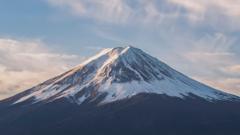In an unprecedented occurrence, Mount Fuji, Japan's tallest peak, has yet to don its snowcap as of late October, marking the longest time without snow since records began over a century ago. Typically, the mountain sees snowfall by early October, but this year has been significantly impacted by unusually warm temperatures.
Mount Fuji Sets Record for Latest Snowless Date in History

Mount Fuji Sets Record for Latest Snowless Date in History
Mount Fuji remains without snow later in the year than ever previously recorded, highlighting unusual weather patterns.
The warmth follows an exceptionally hot summer, with June to August temperatures soaring 1.76°C (3.17°F) above the seasonal average. September continued this trend, affected by the sub-tropical jet stream's repositioning, which facilitated a warmer airflow. According to the Japan Meteorological Society, nearly 1,500 regions suffered extreme heat, defined by temperatures reaching or exceeding 35°C (95°F).
As October progresses, temperatures have retreated slightly but remain above average, leaving the mountain bare of snow more than a month after it would normally be capped. In fact, the first snowfall on Mount Fuji was recorded late last year on October 5. This year marks a significant change, as residents and tourists alike wait for the mountain's signature snowcap.
Yutaka Katsuta, a forecaster at Kofu Local Meteorological Office, indicated that approaching November without snowfall constitutes a historical delay; previously, the latest known snow cover dates back to October 26th, noted twice in 1955 and 2016.
Mount Fuji, located southwest of Tokyo at an elevation of 3,776 meters (12,460 feet) is an iconic symbol of Japan and a popular climbing destination, drawing over 220,000 ascenders last year alone, particularly during the summer months. The volcano, which has remained dormant since its last eruption over 300 years ago, has become a fixture in traditional Japanese art and culture and is a sight to behold for visitors to the capital on clear days.
As October progresses, temperatures have retreated slightly but remain above average, leaving the mountain bare of snow more than a month after it would normally be capped. In fact, the first snowfall on Mount Fuji was recorded late last year on October 5. This year marks a significant change, as residents and tourists alike wait for the mountain's signature snowcap.
Yutaka Katsuta, a forecaster at Kofu Local Meteorological Office, indicated that approaching November without snowfall constitutes a historical delay; previously, the latest known snow cover dates back to October 26th, noted twice in 1955 and 2016.
Mount Fuji, located southwest of Tokyo at an elevation of 3,776 meters (12,460 feet) is an iconic symbol of Japan and a popular climbing destination, drawing over 220,000 ascenders last year alone, particularly during the summer months. The volcano, which has remained dormant since its last eruption over 300 years ago, has become a fixture in traditional Japanese art and culture and is a sight to behold for visitors to the capital on clear days.





















